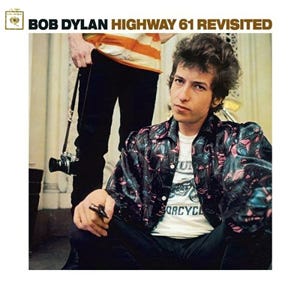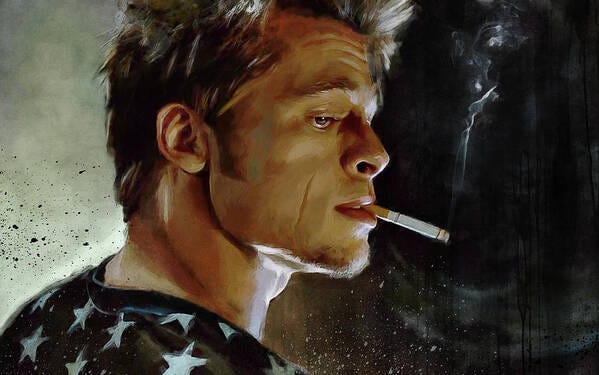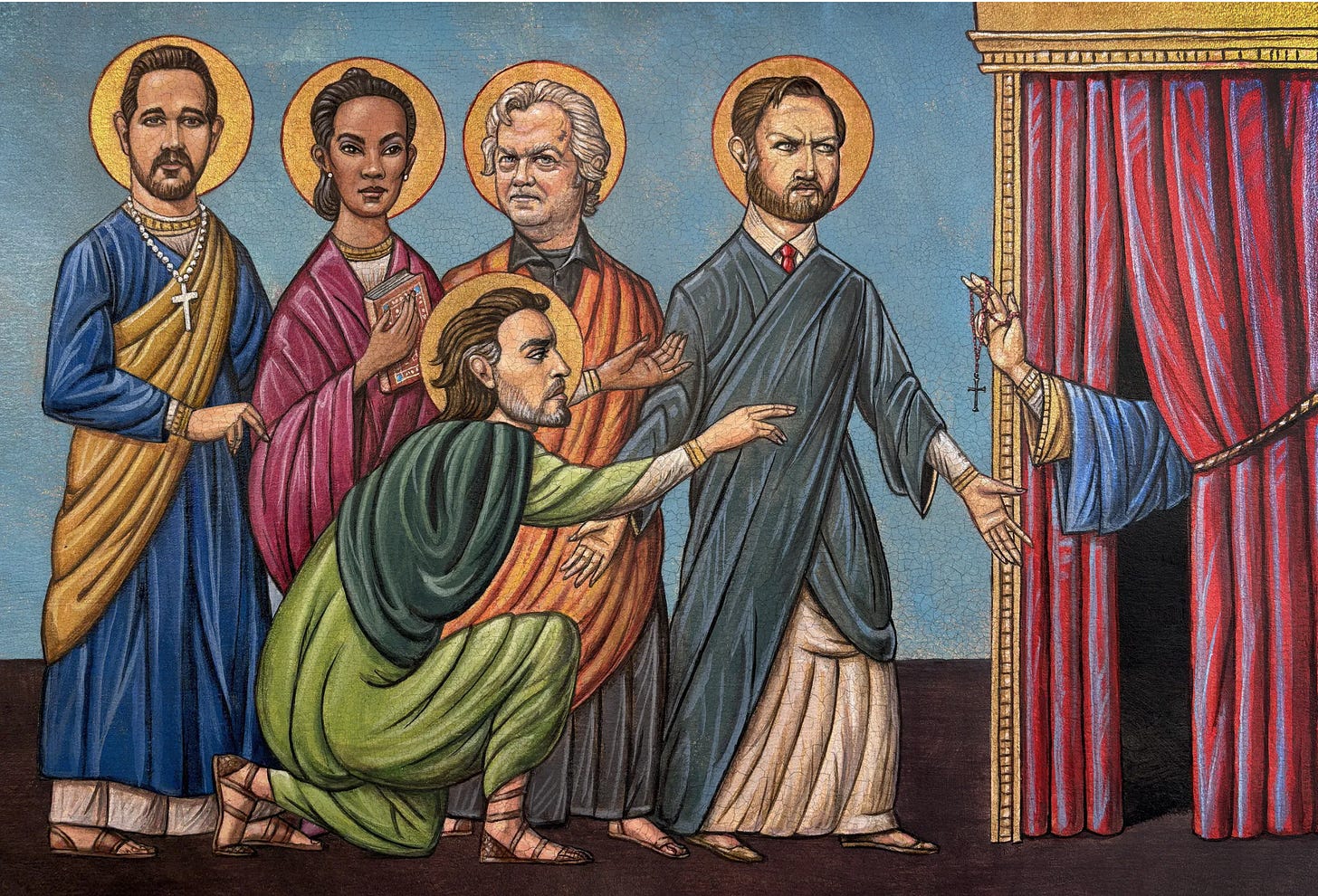If you haven’t noticed, a bunch of people are finding Jesus lately. Not just the old church ladies with their basement Jello molds and seven layer dips.
Not even the skinny jeans/sneaker game Hype Priests that made Hillsong Church go viral with the Bieber and Kardashian set.
(two of these goons are priests. Guess which ones!)
Thoughtful people are getting Jesus.
Serious people.
(and also some people who are neither thoughtful nor serious).
Just last week, Russell Brand, iconic Leftie Anarchist/Socialist working class jester (#alsoproblematic) was praying the rosary with conspiracist Alex Jones (of Sandy Hook and Bohemian Grove infamy).
Ayaan Hirsi Ali, Somali born, former Muslim Brotherhood Islamist, former Dutch politician, current Hoover Institute fellow and half of power couple with Brit economist Niall Ferguson tweeted last Fall she was converting to Christianity
“because I ultimately found life without any spiritual solace unendurable — indeed very nearly self-destructive. Atheism failed to answer a simple question: what is the meaning and purpose of life?”
Candace Owens and Vice Presidential candidate JD Vance have converted to Catholicism after years of atheism too.
What(TF) is going on???
***
Just last week I was up in Toronto to do a podcast with Jordan Peterson. He’s about to release a new book called “We Who Wrestle with God” and it unpacks five Old Testament stories, from Adam and Eve, to Cain and Abel, to Jonah and Job.
His aim is ambitious.
He hopes to link core truths of evolutionary biology (like his famous lobster analogy from his 12 Rules for Life) to social truths (alpha males will always attract deference and mates) to universal laws of God and the Cosmos.
A full stack Theory of Everything.
As it is in the heavens, so it is on the Earth below.
(Hermes would be proud).
But those kind of ambitious Grand Narratives, I suggested to him, are dicey AF.
Especially when you anchor off Old Testament vibes of a vengeful, petty, jealous god and skip his more compassionate Son’s update.
I mean, let’s face it, OG Yahweh was kind of a dick.
Putting Abraham up to murder his own son Isaac down on Highway 61 just for kicks.
Mindfucking Job just to prove to Satan how loyal his subjects were.
Wiping out all of humanity in a flood because they weren’t worshipping him enough.
Bowing up on Adam and Eve when they sought knowledge.
And as far as a track record inspiring more humane humanity, the results haven’t been that great.
All three Abrahamic religions (Christianity, Judaism and Islam) are supposedly united in their reverence for these founding tales.
But it’s not like those shared scriptures got the cousins singing out of the same hymn book.
So that was one of my questions for Jordan.
Why tell Old Testament stories of obedience and harsh justice (which can be so readily weaponized in the culture wars), when we could be dusting off the Sermon on the Mount?
You know the bit.
New Testament, not Old.
Turn the other cheek.
Love thy enemy as thyself.
The meek shall inherit the earth.
Wash the feet of lepers, debtors and prostitutes.
Fuck the Pharisees. Boot the money changers in the Temple
Good ol’ revolutionary Christian ethics. That sort of thing.
Because if we revert back to a pre-Nazarene faith, the story is different.
If Natural Law, Man’s Law and God’s Law are all cut from the same cloth, then a hierarchical dog-eat-dog, survival of the fittest, eye for an eye, follow the leader world should naturally follow.
Efforts to disrupt this “natural order” are seen as weak, ineffectual or outright tyrannical. (see: SJWs, Stalin, Marxism, and “Woke mind viruses”)
It becomes oh-so easy for Fascists to hijack a sweeping tale and use it to justify whatever they want on the ground. (and I mean the term “fascist” technically, historically and accurately, not pejoratively)
Efforts to support this natural order are the stuff of Curtis Yarvin’s anti-democracy calls for Monarchy and Bronze Age Pervert’s return to Classical masculinity.
Even derelicts like Andrew Tate (cigars and sex traffic) and Richard Spencer (of Charlottesville infamy) get a sympathetic hall pass under this regime. They’ve just got the stones to say the quiet parts out loud.
#suckitsnowflakes
But Jordan isn’t wrong either. One of his favorite quotes to unpack is Neitszche’s “God is dead!” declaration.
Most folks know that part. Fewer folks remember the rest of that paragraph.
For sure, Nietzsche was arguing that the reason and logic of the French Enlightenment and scientific revolution had replaced blind faith.
But, he said, there are profound social consequences to lobbing the Baby Jesus out with all that backward-ass bathwater.
“When one gives up the Christian faith,” Nietzsche cautioned, “one pulls the right to Christian morality out from under one’s feet. This morality is by no means self-evident. . . . Christianity is a system, a whole view of things thought out together. By breaking one main concept out of it, the faith in God, one breaks the whole”
That’s where Ayaan Ali and JP are coming in—saying we need to mend the whole and the best way to do that is to reclaim the faith at the center of it all.
Jonathan Haidt, New York University philosopher and author of The Coddling of the American Mind, agrees.
“A part of being human is believing in gods and worshipping and having a sense of the sacred. And I think we have a need, we have a hole in our heart . . . it needs to be filled by something—and if you leave it empty [people] don’t just feel an emptiness. A society that has no sense of the sacred is one in which you’ll have a lot of anomie, normlessness, loneliness, hopelessness.”
But to really understand this current moment and this recent turn towards religiosity, it’s helpful to go back a few years to see what got us into this pickle in the first place.
Because what we’re really experiencing is a collapse in shared meaning itself.
And atheism or even secular humanism, no matter how self-confident they may be in their conclusions, just haven'’t cut it as viable replacements.
The End of Faith
In the spring of 2007 in a stylish town house in Washington, D.C., the Four Horsemen gathered for what was to be their first and only meeting. The home belonged to Christopher Hitchens, journalist, pundit, and author of that year’s God Is Not Great—a comprehensive breakdown of all the bad things done in the name of divinity.
The other three attending were Richard Dawkins, the famous evolutionary biologist, author of The Selfish Gene, and the father of the concept of “memes”; Daniel Dennett, a preeminent cognitive neuroscientist and author of Breaking the Spell; and a fresh-faced youngster named Sam Harris, who’d just published the bestselling The End of Faith.
While Hitchens pointed his dry wit and commentary toward all kinds of faith, including Buddhism and neo-paganism, Harris took particular issue with Islam and its apparent connection to the violence that had engulfed the world since 9/11.
Although each thinker differed in emphasis, they could all agree on one thing: Religion, at its very roots, was a superstitious throwback, doomed to promote suffering and perpetuate ignorance.
Believing in virgin births or martyrs’ paradise, or a world divided into the saved and the damned, these skeptics insisted, was incompatible with modernity, common sense, and reason. At best, they argued, it was infantilizing. At worst, it provided justification for all sorts of horror. The time for Blind Faith was up, they agreed. These Four Horsemen of the New Atheism, as they were soon called, were only too happy to celebrate the End of Faith.
Their timing was good. Demographics bore them out. From the early nineties well into this century, religiosity in America and Western Europe was waning dramatically. Attendance (and with it, revenue and impact) dropped. Churches shuttered or downsized.
Dedicated lifers still attended (the blue-haired church ladies and their ilk), but the younger generations weren’t showing up to take their place. The only nominal growth for Catholicism could be found in the developing world. But in the home countries of Europe and the United States, things were looking increasingly bleak for mainstream Christianity.
By 2015, the Pew Center posted a momentous survey—for the first time in history, the spiritual-but-not-religious, a.k.a. the “Nones,” had surpassed all other organized denominations to become not only the largest but the fastest-growing category of belief in the United States.
The reasons this happened so suddenly are complicated. Social scientists tracked a confluence of events—ranging from the fall of the Soviet Union (and with it, the stigma associated with identifying with “godless” atheism), to the rise of the Moral Majority, which left those uncomfortable with the blurring of church and state seeking more neutral ground.
And finally, there was the fire that sparked Sam Harris into action on September 11, 2001—the sudden and violent ascendance of jihadi Islam onto the world stage. Identifying as a non- believer, for the first time in history, seemed less rebellious or reactionary than simply reasonable.
Scholars of religion, meanwhile, explained sagging faith in different terms. Some focused on the growing divide between church doctrine and social issues, like women clergy, birth control, and gay marriage, that had not kept pace with changing attitudes in their congregants.
Other researchers have identified the burgeoning spiritual marketplace, ranging from Oprah to Tony Robbins to A Course in Miracles, all offering alternate sources for solace, insight, and instruction. Eat, Pray, Love, after all, only cost fifteen bucks, and Elizabeth Gilbert felt guilty so you didn’t have to. Church no longer had a corner on the market for inspiration and redemption.
But the New Atheists’ reports of the Death of Belief were slightly exaggerated. The Four Horsemen were only half right. While the “reasonable” might have been stepping away from orthodox belief, many others were finding themselves pushed to the edges. Lacking anywhere else to center themselves, fundamentalism and nihilism were picking up the stragglers.
While mainline Protestantism and Catholicism were seeing significant drops in attendance, Evangelical megachurches have been booming. They offer a uniquely American mash-up of positive thinking and the Gospel of Wealth. These transdenominational churches encourage congregants to abandon traditional values of poverty, humility, and service in favor of dreaming their #BestLife.
Stage lights, amplified “praise music,” Jumbotrons, and Jesus Rock. The old Catholic standbys of penance, “smells and bells,” never stood a chance.
Despite the leather-jacketed hipster pastors (a genre GQ skewered as “the New Hype Priests”), the doctrinal messaging has remained remarkably conservative. One of the hallmarks of the evangelical movement is literalism—that every word in the Bible is divinely inspired and non-negotiably true.
And while the most outdated mandates are overlooked (like stoning adulterous wives, or mastering slaves, or salting your enemies’ fields), a large chunk of the moral code in these churches stems from word-for-word interpretation of ancient texts.
Rather than meeting in the middle and trying to adapt beliefs for a rapidly changing and modernizing world, these evangelical churches have found that doubling down on tradition (even within a self- consciously contemporary presentation) has been a surprisingly effective way to grow their reach.
Awash in a sea of uncertainty, it seems that many would-be believers are happy to have a solid rock to cling to.
***
For seekers repelled by the tenets of fundamentalism but overwhelmed by uncertainty and complexity, the moderate middle isn’t always enough to hold them.
Those not drawn to the promise of the all-in-one Megachurch don’t always end up where Harris and Hitchens would have imagined—in the realm of reason and rationality. They often drift to the other extreme and fall into nihilism instead.
Pew and Gallup don’t survey this particular group of the unchurched and unbelieving. But public health officials do, and their findings are sobering. Diseases of despair—anxiety, depression, suicide—are rampant. One in six Americans takes psychiatric medications just to cope with the banality of modern life.
To put this in harsh relief, the World Health Organization reports that more people today kill themselves than die from all wars and natural disasters combined. Think of all the hurricanes, floods, and fires and all the civil wars, terrorism, and military conflict that inundate our news feeds. Put together, they don’t match the number of people choosing to leave this world because they cannot bear it any longer.
“We’re the middle children of history, man,” the ultimate nihilist character, Tyler Durden, explains in Fight Club. “No purpose or place. We have no Great War. No Great Depression. Our Great War is a spiritual war, our Great Depression is our lives.”
Meaning 1.0—organized religion—has collapsed, the disconnected and disaffected have realized. But for them, a retreat to the fundamentalism of the faithful remains an unconvincing antidote to a hyper- modern and cynical world. But Meaning 2.0—modernism—hasn’t exactly panned out either. “We’ve all been raised on television to believe that one day we’d all be millionaires, and movie gods, and rock stars,” Durden continues.
“But we won’t. And we’re slowly learning that fact. And we’re very, very pissed off.” For the frustrated middle children of history, nihilism—the view that none of this matters—is their refuge of last resort.
So the Four Horsemen of the New Atheism didn’t get it exactly right. To be certain, the edifice of mainline religion—Meaning 1.0— has collapsed, but secularism—Meaning 2.0—hasn’t been enough to hold the center in its place.
As things fall apart, we’ve seen a migration to the extremes of fundamentalist beliefs on one hand and a drift toward nihilism on the other.
And for those stuck in the moderate middle, identifying as “spiritual but not religious”? The Nones have no particular place to go.
***
And this is where we find Peterson, Brand, Ali, Vance and countless others these days.
Feeling deep concern for the erosion of Western value, certain that when we killed our gods in favor of secular egalitarianism, we sacrificed a coherent center that could hold us all together.
Better angels of our nature and all that…
Just two days after I got back from that chat with Jordan, Vanity Fair published this in-depth piece on this recent wave celebrity conversion to Catholicism.
It’s exactly what I was trying to get at in that convo with JP and totally worth reading.
(Russell) Brand said “the return to God” was an obvious response to crumbling institutions; and Peterson recited a list of prominent former atheists who had come to see that the “humanist enterprise” was unsustainable without being “embedded” in a “metaphysical space.”
Influencers themselves made the case for a cultural, if not personal, conversion. Over several weeks last spring, Joe Rogan delighted Christians by saying, “As time rolls on, people are going to understand the need to have some sort of divine structure to things”;
Then, just yesterday, New York Mag came out with this crazy-ass piece “How Opus Dei Conquered Washington” detailing how that extremist Catholic sect (remember the nutters in Da Vinci Code? That lot, IRL!) has been packing the Supreme Courts and converting powerful politicians to its agenda.
Much of what we’re seeing in the hard-rightward turn in legislation is coming from these guys.
A ton of fascinating detail that should be truly concerning as we lurch towards a theocratic takeover decades (and billions) in the planning.
There’s even a recent bit in Texas Monthly on the “Ortho Bros” inspired by the Confederacy and Tsarist Russia taking over an Eastern Orthodox church in Houston!
If you read the Vanity Fair, New York mag and Texas Monthly bits in succession, what you’ll get is some variation of “Right-wing crazies gonna crazy.”
(despite that, I seriously recommend reading them. They’re thoughtful, well-researched and offer a clear bead on this emerging zeitgeist).
But here’s where I want to pause, and flip the script.
Because it’s not as simple as a right/left split.
Tara Isabella Burton, Oxford PhD and author of the awesome Strange Rites: New Religions for a Godless World has been exploring this turn from the other side of the political fence.
And it seems that it’s not just a right wing thing.
Self-help New Age, Law of Attraction Millennials are feeling the urge to merge too.
More and more young Christians, disillusioned by the political binaries, economic uncertainties and spiritual emptiness that have come to define modern America, are finding solace in a decidedly anti-modern vision of faith. As the coronavirus and the subsequent lockdowns throw the failures of the current social order into stark relief, old forms of religiosity offer a glimpse of the transcendent beyond the present.
further, she even names this movement “Weird Christianity” to capture the bizarre mashup of personal growth and old school deference.
Weird Christianity is equal parts traditionalism and, well, punk: Christianity as transgressive alternative to contemporary secular capitalist culture. Like punk, Weird Christianity has its own, clearly defined aesthetic.
Many Weird Christians across the denominational and political spectrum express fondness for older, more liturgically elaborate practices — like the Episcopal Rite I, a form of worship that draws on Elizabethan-era language, say, or the Latin Mass, or the wearing of veils to church.
The ranks of self-described Weird Christians are small — and largely limited to the internet — but evidence suggests that there may be more interest in the aesthetics of traditionalist Christianity than you might think.
Check the full article Christianity Gets Weird in the Times here.
It’s all a bit kinky, really.
After a lifetime raised by self-absorbed Boomers, told incessantly that following their bliss and making the world a better place (while collecting participation trophies for doing fucknothing), and #bestlifing it for the ‘Gram, and FOMOing it and YOLOing it…
Christ almighty! It’s been an exhausting decade.
Just give me something, these Millennials think, anything, bigger than myself.
Older than myself. More important than myself to believe in. To submit to.
Thank you Sir (or Madam). May I have another.
Obedience as liberation.
Like I said, kinda kinky.
***
So that’s the jam these days, I’m afraid (and hopeful). We killed God a while back. We suffer in their absence.
Aristotle observed that “Nature abhors a vacuum.”
But so does culture.
And when we flail around trying to mend that “God shaped hole in our hearts” both fools and angels rush in to fill it.
There but for the Grace of God, go the rest of us.












You and JP? Oh yes! Taking this in FULLY and will re-read again this weekend to savor the blending of humor and genius. We'd damn well better acknowledge the powerful yearnings/cravings of the "god shaped hole in our hearts" before it's too late...I'm a pragmatic optimist AND our species IS on the edge. THANK you Jamie for sharing your brilliant poly-theoretical mind...with us.
Thousands of years spent “debating” which belief system is true, which belief works the best for a human wanting to win at life, or win at spirituality, so little time, if any, spent asking “is this belief system compatible with life on earth, with how earth works, and with the rest of life on earth?”
Seems most religions and modern spirituality, including the new age and personal development industry, are coming only from, or mostly from, the human centered or human supremacist paradigm. Shaping all of life on earth to coincide with these beliefs. That’s a problem, or maybe even the root of our collective predicament. Make all of earth in the image of a god that man made.
Also kinda seems like most religions helped craft neoliberal economic theory, and it seems like most of the new age, as well as the mega church industry, is just neoliberal economic theory. So these strange bedfellows of new age people, or personal developers, signing up as born-again fundie Christian’s, isn’t strange at all, at root it’s the same exact paradigm. Throw in some confusingly muddled concepts extracted from the greater context of non-dualist philosophies, and it’s a sociopathic nightmare (i.e. I AM GOD therefore can manifest whatever I want, being Source of all!)
Beliefs are certainly important to have for sure, but what if those beliefs aren’t compatible with the rest of our family of life? Beliefs never just stay inside our heads. That’s catastrophe in the making when it’s billions of people believing foggy things and then creating and enforcing those ideas on all the rest of life.
As for spiritual experiences that accompany these beliefs, personally I see them as real, but those beliefs and identities are powerful filters that translate those experiences of Spirit and nature into more of the same human supremacy.
Wish this was openly discussed way way more than it is, so thanks for cracking it open so frequently, Jamie.
Also, does JP ever mention bonobos? Honestly don’t know. Seems he’s got a thing for basing his lifestyle system or philosophy on male adolescent chimps, not just lobsters. Does he ever hang out with Dr Jane Goodall for some “outside the echo chamber” time? Or would he consider a source like, the Max Planck Institute, for example, as anything other than liberal or ungodly propaganda (good ongoing research there about our OTHER closest relative, bonobos, who sure do like to get sexy but that’s still only part of their story, too)
As for the inaccurate stories our popular culture spreads about nature, about how nature is, making the *whole story* about nature, and therefore humans, just about male hierarchy, dominance, and predation, it would be fun for some influencers to spend a few years in the bush working with guides and trackers and indigenous people. Some funny stories from safari guide James Hendry about tourists complaining over how boring the wildlife turned out to be, how little killing and sex actually was going on out there in the wild. Not to mention that it’s the herbivores, matriarchal in their hierarchy, too! that are the most dangerous on-foot but also in-vehicle (ellies and buffaloes)
Pop culture or even “dominant culture” beliefs about nature are inaccurate at best, and yet the entire world has been forced and controlled to try and resemble those overly reductionist, human centered stories.